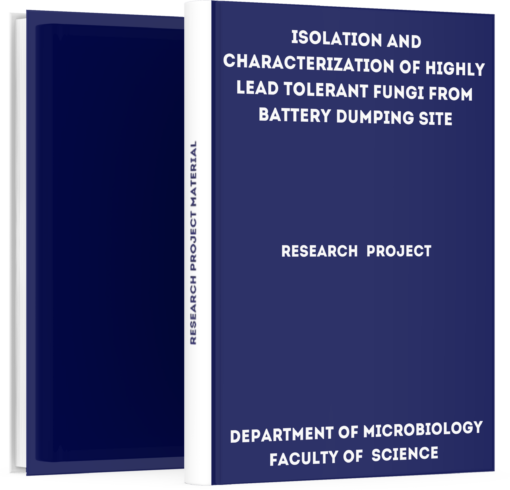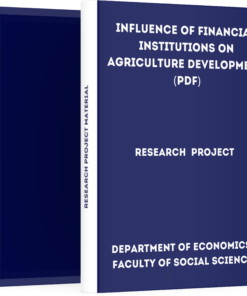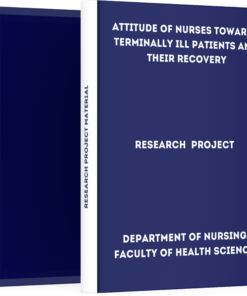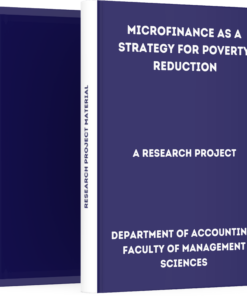Isolation and Characterization Of Highly Lead Tolerant Fungi From Battery Dumping Site
₦3,000.00
If you are interested in getting this project material “Isolation and Characterization Of Highly Lead Tolerant Fungi From Battery Dumping Site”, click on the DOWNLOAD BUTTON to make payment and the file will be delivered to your email immediately after confirmation.
Description
– Isolation and Characterization Of Highly Lead Tolerant Fungi From Battery Dumping Site –
Download Isolation and Characterization Of Highly Lead Tolerant Fungi From Battery Dumping Site. Students who are writing their projects can get this material to aid their research work.
Abstract
Removal of heavy metals from contaminated sites, using microorganisms is a cheaper alternative to chemical technologies, there is therefore a need to isolate identity and characterize the fungal microorganisms that exist and interact in contaminated environment.
Investigation were carried out to isolate fungal strains from the battery manufactured polluted soil at mechanic shop line, Mgbuka Obosi of Anambra State and to test their metal tolerance to lead (Pb), pure cultures were isolated, and characterized.
The isolates UM1 to UM4 are greenish in colour while UM5 blackish in colour. UM1 to UM5 were identified as Aspergillus except UM3 which was identified as both Aspergillus and Penicillum.
Different diameters of the isolates was measured at four different point. Determination of minimum inhibitory concentration (MIC) range of 100g/ml- 2000g/ml with lead nitrate and was found that all the isolates exhibit high resistance to lead.
It has also been noticed that the intracellular accumulation of lead (Pb) changes the color of colonies grown on media with lead, isolates at 100g/ml of um1 shows maximal diameter while 2000g /ml of um1 shows minimal diameter (0.45cm).
After isolation, the 5 pure cultures of the fungal strains were characterized. Data indicated that the isolated fungi are highly tolerant to lead.
Introduction
1.1 Background of the Study
Lead (Pb) is non-bioessential persistent and hazardous heavy metal pollutant of environmental concern. Bioremediation has, become a potential alternate to the existing technologies for the removal and recovery of toxic lead from motor battery dumping area. (Amini et al., 2008).
Environmental contamination by toxic metals, is a serious problem worldwide due to their incremental accumulation in the food chain and continued persistence in the ecosystem. Conventional technologies, such as ion exchange or line precipitation, are often ineffective and or expensive particularly for the removal of heavy metal ions.
The use of microorganisms to destroy, or reduce the concentration of, hazardous waste on a contaminated site is called bioremediation (Amini et al.,2008). Indigenous microbial specie that has high resistance to lead have been isolated from the waste water sample, which was characterized and identified as Staphylococcus species.
Maximum lead tolerance up to 100mg/ml was evidenced by isolated Staphylococcus species, effect on pH on lead degradation by Staphylococcus shows the rate of lead removal was maximum at pH6, optimum temperature of 30oc and incubation time at 48 hours.
Effect of initial metal concentration on lead degradation by Staphylococcus shows the rate of lead degradation was constantly high until 300mg/l and then after it decreased. Under optimum process conditions Staphylococcus is able to degrade lead up to 83% in 48 hours, (Amini, et al., 2008).
In microbiology, the term isolation refers to the separation of a strain from a natural, mixed population of living microbes as present in the environment, for example in soil flora water, or from living being with skin flora, oral flora or gut flora, in order to identify the microbes of interest.
How to Download this Project Material
First, note that we are one of the best and most reliable online platforms because we don’t retain any of your personal information or data as regards making payments online.
PRICE: ₦3,500 ₦3,000 (Three Thousand Naira Only)
Make a bank deposit or mobile transfer of ₦2,000 only to the account given below;
Bank Name: UBA Account Number: 1022564031 Account Name: TMLT PRO SERVICES
After making the payment, CLICK HERE to send the following on WhatsApp;
- Depositor’s Name or Screenshot of Payment
- Name of the Past Question
- Active Email Address
or Call Us On +2348082284439 Once your details have been received and your payment confirmed by us, you will receive the past question in your email or WhatsApp within 5 Minutes.
Guarantee of Getting the Material
We understand that due to the high rate of fraud, many people are afraid of making purchases online but be rest assured that PastExamQuestions will deliver your material after payment.
Once your details have been received and your payment confirmed by us, you will receive the past question in your email or WhatsApp.
Give us Feedback
Have we been able to satisfy you? How well do you think the material will be helpful after having gone through it? Does the price worth the material?
Let’s hear from you! We recommend that our customers give feedback at the end of every transaction to enable us to serve better. You can do this by clicking the review button on this page.
Where is the review button? >> Just scroll up to where you see reviews





Reviews
There are no reviews yet.